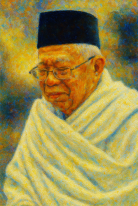Ma'ruf Amin may give Sharia economy a boost
President Joko "Jokowi" Widodo unexpectedly named the Indonesian Ulema Council (MUI) Chairman Ma’ruf Amin as his running mate in the 2019 presidential election. Jokowi's choice surprised the public since many had speculated that former Constitutional Court justice Mahfud MD would be his running mate. He finally picked Amin in the last minute leaders of political parties in his coalition gave their approval.
The president elect had a reason that Amin - a leading and influential figure of the largest Islamic organization, Nahdlatul Ulama (NU) - would help develop Sharia economy in Indonesia.
Data from the Financial Services Authority (OJK) stated that as of June 2022, Indonesia's sharia financial market share was at 10.41%, an increase from 10% in the previous year. However, Amin saw there were still considerable opportunities to develop Islamic economy and finance in the country.
Prior to his candidacy as a vice president, Amin - who was born in Tangerang, Banten, on March 11, 1943 - was a notable cleric and a politician. Since August 2015, he served as the Rais 'Aam (supreme leader) of NU and chairman of the MUI.
Amin had previously served for 7 years as the Presidential Advisory Board (Wantimpres) Chairman from 2007 to 2014. He had also served as a House of Representatives (DPR) member from 1971 to 1999. He has been an NU activist since 1964.
His thoughts
Amin graduated from the School of Ushuluddin (the study of the basic belief in Islam) at the Ibnu Chaldun University in Bogor in 1967. He then taught at the NU University in Jakarta since 1968.
During the long period of his carrier and his social economic and political activities, Amin developed a perspective of social economic thought that was based on his reelection of the reality of Muslim economic life.
In May 2017, the Maulana Malik Ibrahim Islamic University in Malang, East Java, appointed him as a professor of Sharia-based economy. In his scientific speech, he said there were two solutions based on the Islamic law for the current economy of Indonesia.
First, he said, by supporting the broadening of Sharia-based economy. Amin talked about the influence of fatwa (Islamic edict) on the issuance of law and its impact to Sharia-based economy. He said when the MUI issued a fatwa considering bank interest as usury, Sharia-based banks rapidly grew. The edict also encouraged the government to issue several laws such as Law No.19/2008 regarding State Sharia Securities and Law No. 21/2008 on Sharia-based banks.
From 1990 to 1998, there was only one Sharia bank but in 1998 to 2002 there were 5 new Sharia banks. From 2003 onwards, there have been many new Sharia banks.
Amin welcomed the government efforts to develop Sharia-based economy. One of the examples is the issuance of sukuk (Islamic bonds) and other Sharia-based financial instruments such as insurance, leasing and capital market. Amin also hoped that the government could develop Sharia-based business and tourism. Beside, Indonesia has a potential market considering the large Muslim population. Sharia-based economy can give economic benefit for the actors.
Second, the bottom-up economic approach. Amin supported the approach, saying it has been stipulated as the new era of Indonesian economy. He said that in the future, national economy should supported by Muslims as the majority of Indonesia's economy, instead of being only supported by a small number of conglomerates. He added that if the government had a strong commitment, Indonesia could create Sharia-based market as well as become a player in the Sharia-based economy.
In his opinion, non Muslim conglomerates and Muslim poor should have a mutual cooperation and mutual benefit in narrowing the economic gap within the society.
His actions
Amin has developed a cooperation with the government, conglomerates, private sectors, financial institution and certainly the Muslims groups as well as pesantren (Islamic boarding schools). His idea was culminated in a development model that he mentioned as Sharia Incubation Centers in all provinces in Indonesia. The model includes:
- Halal Incubation Centers that work together with small and medium enterprises, food producers and the MUI's Institute for the Review of Food, Drugs and Cosmetics (LPPOM).
- Sharia-based cooperatives that center around mosques.
- National Peanut Agribusiness Program that involves food companies such as GarudaFood, Perhutani, PTPN , local administrations and farmers from various Islamic group and Palembang Muhammadiyah University. The program kicked off in Alang Kemangi village in Bojonegoro regency, East Java, and also in South Sumatra. GarudaFood will be the offtaker of the farmers' peanut harvest.
- Ultra Micro Credit program involving the Finance Ministry, the Communication and Information Technology Ministry, the Cooperatives and Small- and Medium-Enterprises Minister, Sharia-based cooperatives and local administrations.
- A cooperation with PT Medco Energy International and the Indonesian Muslim Businessmen Community (KMPI) to initiate the National Sheep Program (Prodombas) involving pesantren, Islamic mass organizations, Sharia-based cooperatives and universities.
- The Association of Indonesian Retailers (Aprindo) and the Indonesian Employers Association (Apindo) worked together with Transmart, RW Mart and Sinar Mas group.
- Corn cultivation program in cooperation with feedstock company Japfa Comfeed.
On May 24, 2022, Amin hoped that modern retail entrepreneurs would continue to market MSME halal products in Indonesia. He said modern retail would support the marketing of halal MSME products that were halal certified. This step is to expand MSME halal products not only in ordinary stores but up to the modern retail level.
"So that later, it will be easy for people to find halal products as they are already available in supermarkets," said the Vice President.
Tag
Already have an account? Sign In
-
Start reading
Freemium
-
Monthly Subscription
20% OFF$29.75
$37.19/MonthCancel anytime
This offer is open to all new subscribers!
Subscribe now -
Yearly Subscription
33% OFF$228.13
$340.5/YearCancel anytime
This offer is open to all new subscribers!
Subscribe now






